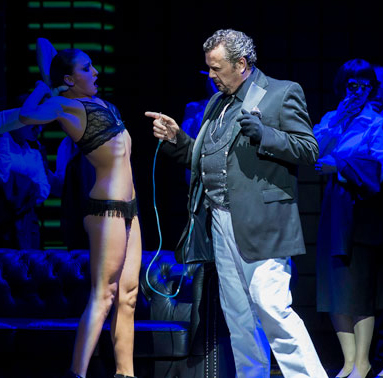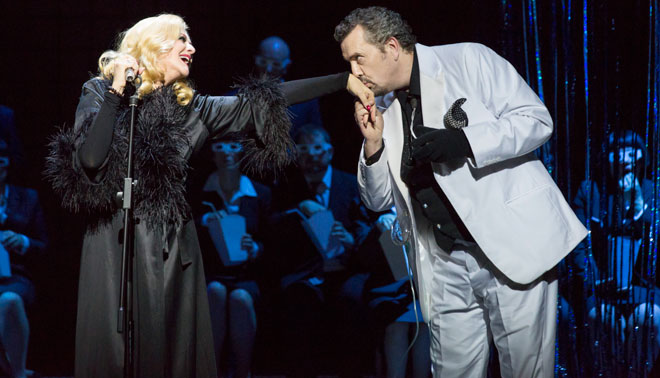If there was one word that would sum up Welsh National Opera it would be progressive. They do not rest on their, or opera’s, laurels. They often choose fairly obscure, rarely performed pieces and present them in a new and original way. Their previous season, The Tudors, demonstrated their approach perfectly. However, the three relatively unknown pieces were offset by the inclusion of an almost conventional production of Tosca.
Their current season also has a theme, and one that would not have been too difficult to put together, entitled Fallen Women and consists on Manon Lescaut, Boulevard Solitude and La Traviata.
Manon Lescaut
Puccini is often pooh-poohed by opera buffs because they consider him too popular and too melodic – too easy to enjoy. Opera, they feel, needs to be difficult and intellectual to be worthwhile. It’s true that many people’s first taste of opera is through pretty songs like Nessun Dorma, the Humming Chorus or Che Gelida Manina and yes, it’s true, that hearing Luciano belting out his greatest hit at a football match can jar a little. Nevertheless, no matter how sophisticated your opera palette becomes, no matter how much you delve into the nether reaches of Wagner, Donizetti or even Berg, Puccini is always there, always with the best songs.
Manon Lescaut is one of Puccini’s lesser known, less frequently performed works, playing in Division One, never able to compete with the Premier League’s Madam Buttlerfly, Tosca or La Boheme. Which is a pity, because I think it can hold its own against any of them.
The story is grist to the operatic mill. In a nutshell, the beautiful Manon falls in love with penniless student but cannot resist going off with an older, wealthy man. She eventually leaves the older man to return to her true love but inadvertently forgets to return the jewels he has bought her. She is arrested, sent to jail and … well, it doesn’t end happily.
The story is set all over France in the late eighteenth century but from this production, you’d never guess. The opening scene is set on modern Parisian Metro station with besuited business types replacing the students that the original calls for. The first song Ave, sera gentile beautifully sung by Simon Crosby Buttle sets the tone. His character, Edmondo, is portrayed as a cleaner with a broom and Hi-Viz jacket. The setting and the concept worked well and the rest of the action took place in the same basic set with the addition on the odd sofa, bar or bath.
I am a great fan of bringing opera’s visual presentation and interpretation up to date and WNO is expert at achieving this. However, I did feel occasionally in Manon Lescaut, the interpretation seemed a bit arbitrary, sometimes at the expense of the story – and did I detect an “in joke” running gag about an injured leg which at least three of the characters were stricken with? Also, at times I found the scene shifting very distracting. On a couple of occasions poor old Gwyn Hughes Jones was singing his socks off while being seriously up-staged by the crew struggling with a white leather sofa. That was not good.
Mr Hughes Jones sang Des Grieux beautifully and in this opera has great material to work with. I think Manon Lescaut is beautiful throughout with haunting, memorable themes and dozens of unforgettable songs and duets. Chiara Taigi was excellent as a suitably slutty, though heart-of-gold, Manon.
Geronte, believably and menacingly played by Stephen Richardson, is portrayed as a sort of Paul Raymond sleaze merchant surrounded by pole dancers and other scantily clad young ladies. There’s a lot off glitter – The Madrigal was performed by an ersatz Diana Ross and the Supremes complete with bouffant hair and sequined frocks.
Another memorable, sleazy and rather disturbing scene was when the manacled, female prisoners were being paraded, until they dropped, in front of a gawping, baying crowd who held up score cards as the fallen women fell. Very Strictly Ballroom. There were some bits of this production that very much put me in mind of Clockwork Orange not least the leather-strapped bikini-clad girl (with a bandaged leg?).
There were some issues with this production but the singing and the orchestra, conducted by Lothar Koenigs, were superb. Overall this was an unforgettable evening which I really enjoyed. There are few companies, opera or theatre, that you can trust not to disappoint and Welsh National Opera is certainly one of them. ★★★★☆ Michael Hasted
La Traviata
An audience of 1,800 souls yelling “Bravo!” at the end of this ‘gourmet’ production of Verdi’s La Traviata at the Bristol Hippodrome was proof enough that the Welsh National Opera had touched hearts and minds with this the most celebrated piece within its Fallen Women series.
David McVicar’s dignified direction, together with a sumptuous set by designer Tanya McCallin, and magical lighting by Jennifer Tipton presented the very best opportunity for the main protagonists to shine. And shine they did. Soprano Linda Richardson’s portrayal of the courtesan Violetta was an emotional tour de force, matched in depth by the full-bodied baritone of Alan Opie’s Giorgio Germont, father of the unfortunate love-struck Alfredo, who on the night was sung by Ji-Min Park, stepping in for the absent Leonardo Capalbo.
From the moment Alfredo walks slowly across an empty stage during the overture, with the red petals of a broken flower tumbling from his fingers, and a look of loss imprinted on his face, it is clear we are to soon share in a very private grief. But suddenly we are swept into the middle of a noisy high-society party in mid-nineteenth century Paris, as party-goers sashay around candle-lit tables festooned with bottles of champagne. The scene had the qualities of a Jean Auguste Ingres oil painting – luxurious dark drapes arranged to frame the action that culminated in Violetta’s gloriously giddy and ecstatically delivered Sempre Libera, with which she draws the proceedings to a close.
David Pountney, Chief Executive and Artistic director of the WNO asks us to consider our own assumptions to the term ‘fallen woman’. Where are the fallen men for instance? As he puts it, “The word ‘courtesan’ cloaks a professional activity with a romantic sheen of period glamour.” Verdi himself had to accommodate the pruderies of mid-nineteen century Venetians by distancing the audience from salaciousness by setting the action back a century, and refraining from his intended use of contemporary dress in the first production. As we consider tonight the highs and very lows of plying the oldest profession, we read in the press the very next day that some (men) in the Indian Socialist Party are calling for women who have had extra-marital affairs, or who are even rape victims, to be hanged. Gender politics are clearly still nascent.
A simple but effective use of a white drape and sunlit lovers’ bed illustrates a happier time for Violetta and Alfredo in Act Two. Further assumptions about the waywardness of ‘scarlet women’ are overturned as it soon becomes apparent that it is Violetta running into debt to fund the triste, and allowing real love to find expression. Ji-Min Park as Alfredo builds his ardour for Violetta steadily throughout the performance, till the auditorium literally vibrates with his passion at the conclusion. Linda Richardson convinces utterly with her wracked body jolts as the TB takes hold of her Violetta, before her final devastating moment has won our complete sympathy. Verdi’s great triumph is that this work can still work down to our core and shake us with its great ironies.
Throughout, the Welsh national Orchestra, conducted with understated sensitivity by Simon Phillippo, was on top form. The call and response passages played by the oboe with Linda Richardson soloing were particularly mesmerising. Strongly recommended. ★★★★★ Simon Bishop



